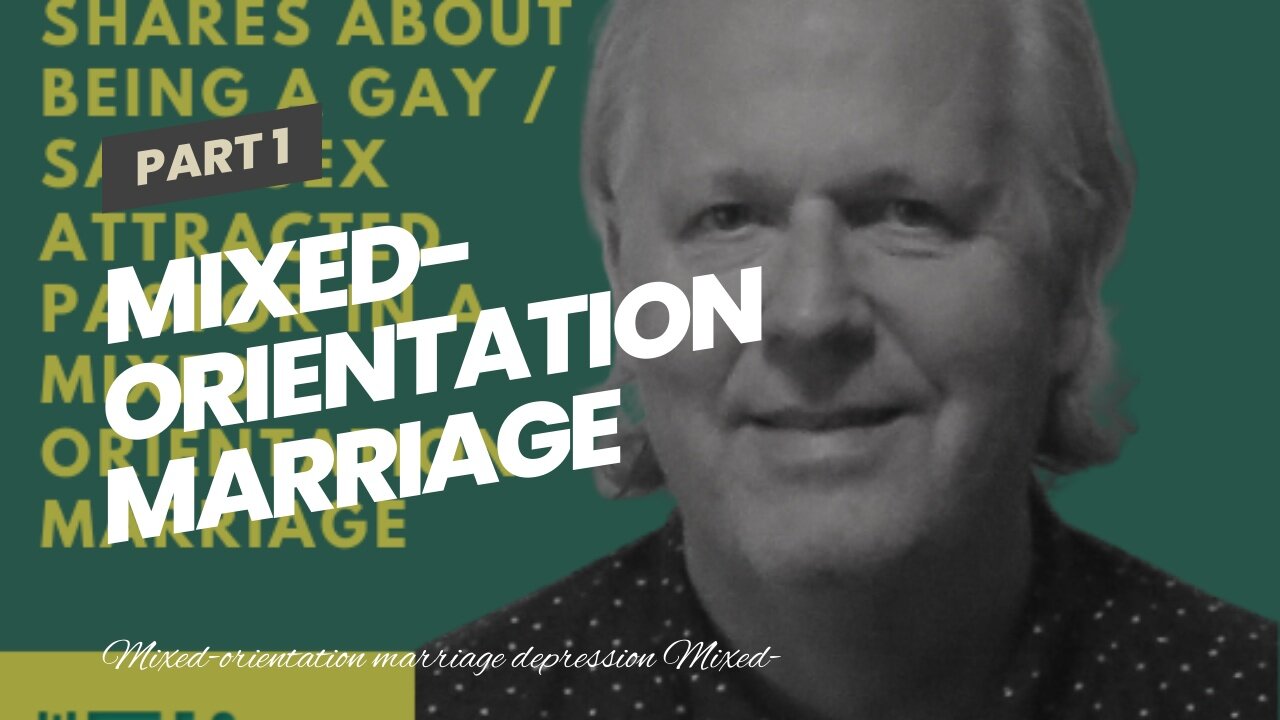Premium Only Content

Mixed-orientation marriage depression
https://www.mrdepression.com/mixed-orientation-marriage-depression/
Mixed-orientation marriage depression
Mixed-orientation marriage depression Mixed-orientation marriage depression. Very little research has examined the psychological adjustment of gay men in mixed-orientation marriages (MOMs) – a marital union wherein one spouse is a sexual minority person (e.g. Black, Asian, mixed-orientation). The finding suggests that homosexual people are more likely to be married to heterosexual or bisexual partners than heterosexual men, who are slightly more likely to be single or married. Some studies had shown that homosexuality could have an impact on gay marriage.
gay/lesbian, bisexual) while the other is heterosexual. The only difference between these two profiles is that the first is male; the other is female. All others are also heterosexual (non-lesbian, bisexual), despite both being equally likely to have sex at least once daily. In other words, heterosexuality is about what makes the heterosexual profile so unique — a unique profile which is more likely to exist that does not exist out of many, many people’s normal, normal selves. Examining gay men’s psychological adjustment in MOMs provides insights into how sexual identity intersects with relationship dynamics to shape mental health in heteronormative societies. MASSIVE research and treatment of queer and questioning sexuality by feminist scholar, historian, and sociologist Mariana Gossman is described in this fascinating study.
Based on survey responses from 54 Chinese gay men in MOMs who simultaneously engage in a same-sex relationship occurring outside of marriages, the current exploratory study examined the relative contributions of marital relationship quality, same-sex relationship quality, and sexual identity to their psychological adjustment (i.e. physical health). The research provides further evidence for the presence of marriage as a marker of social dysfunction and sexual health at a range of demographic and environmental level in a sample of over 12,000 Chinese men. Mixed-orientation marriage depression: what researches tell us. Multiple regression analyses revealed that positive sexual identity was a significantly negative predictor of depression and loneliness and a significantly positive predictor of life satisfaction. Only negative sex identity was significant predictors for depression and loneliness. In spite of our findings concerning social isolation, these differences could be due to various genetic mechanisms that may allow females to avoid social isolation. There are some factors that have influence on life satisfaction, such as the degree of sex and sexual partner status; that influences both social isolation and depression.
Whereas marital relationship quality was significantly and positively associated with life satisfaction and negatively associated with loneliness, same-sex relationship quality was not a significant predictor of psychological adjustment. The results suggest that it may take substantial effort, and even mental effort, to achieve a long-term relationship with an adolescent child and it is important that children who participate in early adolescence play with affectionate and supportive relationships. Mixed-orientation marriage depression: conclusions. Results indicate that both sexual identity and marital relationship quality play important roles in the mental health of gay men in MOMs. This has implications for research into what is responsible for this psychological decline. We suggest that this shift in sexual orientation may be due to the psychological influence of religious fundamentalists, or to the fact that they support homosexuality.
Discussion focuses on the sociocultural contexts in China that in part shape gay men’s situations in MOMs. The survey also included studies of MOMs’ experiences (see review in Ref. 2). However, despite the potential of such qualitative sampling, we were unable to detect significant differences in attitudes regarding the acceptance of trans people in MOMs over heterosexuals.
Acknowledgments: We thank Professor Ellen Greenberger for her insights in the conceptualization of this project and Feng Lu and Changhui Song for their research assistance. We would also like to thank everyone who generously provided feedback about this study, including the editors, the reviewers and researchers who worked hard to publish, to the editors’ families and friends, many of whom have already contribut...
-
 19:26
19:26
GritsGG
1 day agoChat Picked My Hair Color! All Pink Loadout & Operator Challenge!
28.3K4 -
 10:32
10:32
Nikko Ortiz
1 day agoFunniest Fails Of The Month
56.7K8 -
 1:27:34
1:27:34
TruthStream with Joe and Scott
4 days agoArchitect Richard Gage: 911 truths and more #482
32.7K7 -
 LIVE
LIVE
Lofi Girl
2 years agoSynthwave Radio 🌌 - beats to chill/game to
205 watching -
 56:48
56:48
The HotSeat
14 hours agoI'm NOT Sorry! Guns Aren’t the Problem—Godless Culture Is
37.2K30 -
 9:43
9:43
The Pascal Show
16 hours ago $0.95 earnedWHOA! Annunciation School Sh**ter Identified... Heartbreaking & Insane
8.82K2 -
 22:42
22:42
Liberty Hangout
10 hours agoCollege Democrats Say Gangs Are GOOD!
82.6K72 -
 2:14:50
2:14:50
Badlands Media
15 hours agoBadlands Media Fantasy Football Live Draft
49.4K1 -
 2:12:29
2:12:29
Inverted World Live
9 hours agoWe Are Time Travelers | Ep. 100
91K13 -
 2:57:09
2:57:09
TimcastIRL
10 hours agoCorporate Press Refuses To Mention Minneapolis Shooter Was Trans | Timcast IRL
200K114